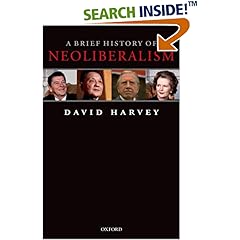
I got tired of blogging for a while. But I'm back. In the next few days I'll be "reviewing"/summarizing David Harvey's A Brief History of Neoliberalism. Here's something to get you started:
David Harvey's A Brief History of Neoliberalism makes for compelling reading for those interested in the political economy of the last thirty-odd years. Or should I say thirty odd years.
Of particular interest is not only the historical sweep of the book, or its relative clarity compared to other works by Harvey, but the prism the author gives the reader to understand the present contradictions of globalism comprehensively, from economic, political and, yes, even moral points of view.
The book's foundation stands on Harvey's ability to weave the global aspects of international capital into case studies of countries who have tried neoliberalism (voluntarily or not) to varying degrees, from Britain to Chile, Argentina, Mexico, China and, of course, the U.S. From his analyses, Harvey steps naturally and logically out of history and into an investigation of the current state of neoliberalism and its possible futures. As Harvey points out, citing visionary thinking of Polanyi, neoliberalism, in both philosophy and practice, is fraught with contradictions and ambiguities that lend it strength while undermining its central tenets. In a word, there is much to be afraid of, but there is also space for hope.
Freedom
Understanding neoliberalism requires an introduction to the basic tenets of 'freedom' as laid out by the Mont Pélerin Society shortly after World War II. Led by political philosopher Friederich van Hayek, the society set out to combat what they saw as the primary “dangers” facing the Occident:
The central values of civilization are in danger...even that most precious possession of Western Man, freedom of thought and expression, is threatened by the spread of creeds, which...seek only to establish a position of power in which they can suppress and obliterate all views but their own.
The group holds that these developments have been fostered by the growth of a view of history which denies all absolute moral standards and by the growth of theories which question the desirability of the rule of law. It holds further that they have been fostered by a decline of belief in private property and the competitive market; for with the diffused power and initiative associated with these institutions it is difficult to imagine a society in which freedom may be preserved. (Harvey 20)
Hence, as Harvey points out, freedom bcomes the result of private property and a competitive market. Relying on neoclassical economics and the rational actor, neoliberalism showed a great distrust of certain types of government intervention such as centralized control of the economy as predicated in the Keynsian tradition coming out of the Great Depression and especially in the dirigiste form found in countries like France and Mexico. The founding Neoliberals believed that no government had enough access to economic information to accurately plan an economy and that only the invisible hand of the market could make such decisions.
“The scientific rigor of its neoclassical economics does not,” writes Harvey, “sit well with its political ideas of freedom, nor does its supposed distrust of state power for a strong and if necessary coercive state that will defend the rights of private property, individual liberty and entrepreneurial freedoms” (21). Indeed, the contradictions between personal and entrepreneurial freedom become rapidly apparent as one neoliberal state after another paradoxically increases state power over the individual to ensure freedoms for that other individual, the corporate enterprise. This seems to prove the thinker Polayni uncannily prescient:
Planning and control are being attacked as a denial of freedom. Free enterprise and private ownership are declared to be essentials of freedom. No society built on other foundations is said to deserve to be called free. The freedom that regulation creates is denounced as unfreedom; the justice liberty and welfare it offers are described as a camouflage of slavery. (Harvey 37)
Besides these obvious contradictions, neoliberalism is also blind to power within the system. (Perhaps this is intentional.) Because no market is free from the influence of power, there is a tendency in them to move towards monopolistic or oligopolistic forms of enterprise. While there are some exceptions, this has proven true in almost every mature market, whether it is a question of car manufacturers or, in particular and most dangerously, mass media. Mirroring the establishment of giant enterprises is the revival of a self-reinforcing and growing elite using wealth to increase power and vice versa. The result, as Harvey notes, means that the top 358 fortunes of 1996 equaled the combined wealth of the bottom 2.3 billion, that is, the bottom 45% of the world's population (34-35). In other words, neoliberalism has meant a revival of class power, and this too has implications for freedom, since the voices of many poor and middle-class citizens remain unheard or weakened under the strains of the supposedly democratic neoliberal state.
End of part I. More to follow tomorrow.

